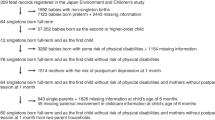Abstract
This paper uses the NLSY-Child data to assess the effects on cognitive and social-emotional development of father care as a child care arrangement among children in two-parent families with working mothers. Our results show that father care for infants is no better or worse than other types of arrangements. However, toddlers in non-paternal modes of child care (e.g., relatives, family day care or center care) have slightly better cognitive outcomes than those whose fathers provided care. Although our analyses do not provide a definitive explanation for this finding, there is a substantial influx of fathers in our data who provide child care in years 2 and 3 and these fathers appear compositionally different from fathers who provided care during a child's infancy. In particular, there is some indication that these fathers who are newly providing care during a child's toddler years may be temporary care providers due to changing economic circumstances.
Similar content being viewed by others
Author information
Authors and Affiliations
Corresponding author
Additional information
The research was supported by NICHD grant #HD30944.
Responsible editor: Deborah Cobb-Clark.
Rights and permissions
About this article
Cite this article
Averett, S., Gennetian, L. & Peters, H. Paternal child care and children's development. J Popul Econ 18, 391–414 (2005). https://doi.org/10.1007/s00148-004-0203-4
Received:
Accepted:
Issue Date:
DOI: https://doi.org/10.1007/s00148-004-0203-4




